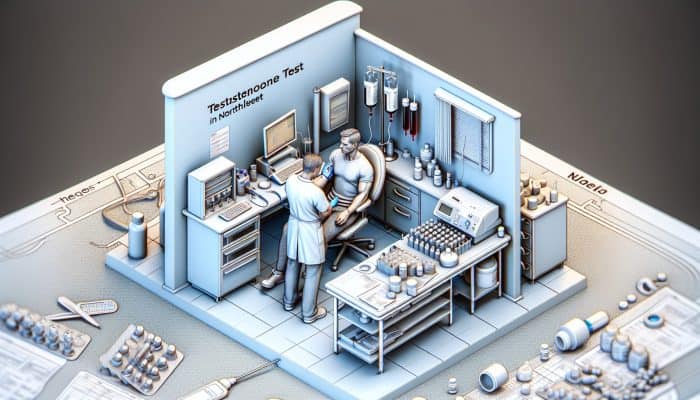Discovering Optimal Health: Understanding the Importance of a Testosterone Blood Test
Crucial Information About the Testosterone Blood Test You Should Know

A testosterone blood test in Northfleet represents a vital medical assessment that evaluates the levels of testosterone, a crucial hormone necessary for numerous bodily functions. This hormone plays a significant role in the development of muscle mass, maintaining bone density, and controlling libido. By accurately measuring testosterone levels, healthcare professionals can identify a range of health issues associated with hormonal imbalances, highlighting the necessity of this test as a key component of male health evaluations and the enhancement of overall wellness.
A comprehensive understanding of the complexities involved in this test is essential, as it allows healthcare providers to detect both low and high testosterone levels, each presenting unique health implications. Elevated testosterone levels may indicate a variety of disorders, emphasising the importance of grasping these hormonal dynamics to develop effective, tailored treatment strategies that meet individual health needs and circumstances.
Primary Goals of the Testosterone Blood Test: Key Insights
The main objective of a testosterone blood test in Northfleet is to evaluate and monitor hormonal health. This assessment is particularly beneficial in diagnosing conditions such as hypogonadism, a condition where the body does not produce adequate testosterone. Symptoms linked to this condition may include diminished libido, persistent fatigue, and reduced bone density, all of which can drastically affect quality of life and overall health.
Furthermore, this diagnostic tool is essential for investigating infertility issues and specific types of sexual dysfunction. Men experiencing fatigue or significant mood swings may discover that their testosterone levels are critical contributors to these concerns. Understanding these levels empowers individuals to pursue targeted treatment options, which may include lifestyle adjustments, hormone replacement therapy, or further exploration into other health issues that may disrupt their hormonal balance.
Step-by-Step Guide to the Testosterone Blood Test Process
Participating in a testosterone blood test in Northfleet involves a straightforward and uncomplicated procedure. It typically starts with a qualified healthcare professional drawing a blood sample from a vein in your arm. This process occurs in a clinical environment, ensuring that the setting is sterile and safe, which is crucial for the accuracy of the test results.
After the blood sample is collected, it is sent to a laboratory for a thorough analysis. The techniques employed in testing are efficient, using various methods to evaluate testosterone levels, including both total and free testosterone measurements. Understanding which specific test aligns best with your health assessment is crucial, and healthcare providers generally offer guidance based on your unique health history and requirements.
Essential Preparations for Accurate Results from Your Testosterone Test

Proper preparation is critical for ensuring accurate results from a testosterone blood test in Northfleet. Patients are typically advised to refrain from eating or drinking anything other than water for a specified period before the test. Following these guidelines is vital, as it ensures that the test results accurately reflect hormone levels, free from any interference caused by recent food intake.
Factors such as stress, illness, or even recent physical activity can distort results, underscoring the importance of meticulously adhering to preparatory instructions. Being well-prepared not only establishes a reliable baseline for testosterone levels but also assists in accurately identifying potential health issues that may warrant medical evaluation and intervention.
Mastering the Art of Interpreting Your Testosterone Test Results
Understanding the outcomes from a testosterone blood test in Northfleet requires a solid grasp of normal hormonal ranges, which can vary significantly based on age and sex. Healthcare providers will compare the obtained values against these established reference ranges to accurately assess your hormonal health.
Abnormal testosterone levels, whether elevated or decreased, often necessitate further investigation. Low testosterone levels may indicate health disorders that require intervention, whereas high levels might prompt additional tests to rule out serious underlying health issues. Engaging in an informed discussion with your healthcare provider following the test is crucial for understanding the implications of these results on your overall health and future treatment options.
Your Premier Choice for Testosterone Testing: The Unique Advantages of Northfleet
Local Expertise in Healthcare Services for Comprehensive Assessments

Choosing Northfleet for your testosterone blood test allows you to benefit from services enriched with local expertise. The healthcare professionals in this area not only possess the necessary technical skills to conduct the tests but also the crucial knowledge to interpret the results comprehensively. Their familiarity with prevalent health issues in the community enables them to provide pertinent advice and customised treatment plans that resonate with local demographics.
Moreover, many practitioners in Northfleet specialise in men's health, enhancing their capability to manage sensitive discussions regarding testosterone levels and overall wellness. This focus fosters an atmosphere where individuals feel comfortable addressing their health concerns, ensuring a thorough and supportive approach to healthcare.
Accessible Testosterone Testing Locations Throughout Northfleet
Convenience is paramount in healthcare accessibility, and Northfleet offers numerous clinics and laboratories that provide effortless access to testosterone blood tests. With various facilities available across the area, residents can easily find a nearby clinic, thereby removing barriers that often discourage individuals from seeking vital health assessments.
These local clinics frequently utilise modern technology and qualified staff, ensuring that patients receive efficient, high-quality services. The ease of access facilitates quicker appointment scheduling, minimising disruptions to daily life and enabling individuals to prioritise their health without the burden of extensive travel or prolonged waiting times.
Cost-Effective Testosterone Testing Solutions in Northfleet
Opting for Northfleet for your testosterone blood test can be a financially savvy choice. The testing fees in this region are often more competitive than those found in larger metropolitan areas, making it an appealing option for those concerned about healthcare expenses.
Additionally, numerous clinics in Northfleet accept a wide range of health insurance plans, which can further reduce out-of-pocket costs. Understanding these financial aspects can alleviate worries regarding the affordability of essential health evaluations, making proactive health management more accessible for local residents.
Strategic Preparation for Your Testosterone Blood Test
Comprehending Fasting Guidelines for Optimal Testing Outcomes
Preparing for a testosterone blood test in Northfleet typically involves adhering to specific fasting guidelines. Healthcare providers may suggest that patients abstain from consuming anything except water for a designated period before the test. Following these fasting protocols is crucial for ensuring that the results are accurate and not influenced by recent dietary habits.
Generally, the fasting duration ranges from 8 to 12 hours, based on the specific instructions given by your healthcare provider. Adhering to these recommendations is vital, as it helps establish a clearer picture of your testosterone levels, ultimately leading to more precise diagnoses and informed treatment suggestions.
Key Medication Disclosure Before Testing
When preparing for a testosterone blood test in Northfleet, it is essential to inform your healthcare provider about any medications you are currently taking. Certain drugs can significantly impact testosterone levels, and your doctor may recommend temporarily discontinuing specific medications before testing to avoid skewed results.
For example, medications related to hormone therapy, anabolic steroids, or even some antidepressants can affect hormonal balance. Open communication regarding your medication history empowers your healthcare provider to guide you effectively through the preparation phase, ensuring that your test results accurately reflect your health status and any treatment needs that may arise.
Optimal Timing for Accurate Testosterone Assessments
The timing of your testosterone blood test in Northfleet can greatly influence the accuracy of the results. Testosterone levels naturally fluctuate throughout the day, typically peaking in the early morning. Consequently, healthcare providers often recommend scheduling tests for early in the day to obtain the most reliable results.
Aligning the timing of the test with these natural hormonal cycles enhances the likelihood of receiving accurate testosterone measurements. This understanding assists healthcare professionals in making informed diagnoses and proposing potential treatment options tailored to your unique hormonal profile.
Addressing Lifestyle Factors Before Your Test
Various lifestyle factors can significantly impact the outcomes of a testosterone blood test in Northfleet. Activities such as engaging in intense exercise, consuming alcohol, or experiencing elevated stress levels immediately before the test can alter testosterone levels. Therefore, it is advisable to avoid strenuous physical activity and limit alcohol consumption in the days leading up to the test.
Moreover, ensuring adequate sleep and effectively managing stress levels can contribute to stabilising hormone levels, leading to a more accurate assessment. These lifestyle adjustments not only enhance the reliability of your test results but also promote better overall health and well-being in the long term.
What to Expect During Your Testosterone Blood Test
A Detailed Overview of the Blood Testing Process
Undergoing a testosterone blood test in Northfleet is generally a quick and straightforward process. The blood draw is performed by a trained phlebotomist who will prepare the site, usually on the arm, for the collection procedure. This process is swift, often taking just a few minutes from start to finish, thus ensuring minimal disruption to your daily routine.
Patients commonly report only mild discomfort during the blood draw, which may feel like a slight pinch. Understanding that this procedure is quick and uncomplicated can help alleviate any anxieties associated with the test, allowing individuals to concentrate on the significance of the assessment rather than any temporary sensations experienced during the blood collection.
Managing Discomfort During the Blood Collection Process
While the prospect of a testosterone blood test in Northfleet may induce some apprehension, it is important to recognise that any potential discomfort is typically minimal and short-lived. Patients may experience a minor sting as the needle enters the skin, followed by a feeling of pressure during blood collection.
For most individuals, this discomfort dissipates almost instantly once the needle is removed. Being aware of what to expect can help alleviate anxiety, allowing patients to focus on the significance of the test rather than the brief sensations associated with the blood draw.
Post-Test Activities and Recommendations for Patients
Once the blood sample has been collected during your testosterone blood test in Northfleet, you are free to resume your usual activities immediately. Typically, there are no significant restrictions or recovery protocols following the test, making it an efficient aspect of your healthcare routine.
The collected sample will be forwarded to a laboratory for detailed analysis, undergoing meticulous examination to accurately gauge testosterone levels. Recognising that this procedure is straightforward can help ease any pre-test nerves, enabling you to focus on the next steps in your healthcare journey with clarity and intent.
Understanding the Timeline for Receiving Your Test Results
After your testosterone blood test in Northfleet, patients usually receive their results within a few days to a week, depending on the laboratory's processing capabilities. This relatively swift turnaround allows for timely discussions with healthcare providers concerning the interpretation of results and any necessary follow-up actions.
Receiving results promptly can provide peace of mind, enabling individuals to swiftly address any concerns regarding their hormonal health. It also establishes the groundwork for potential next steps, whether that involves treatment strategies, further testing, or lifestyle modifications based on the findings.
Breaking Down Your Testosterone Test Results: Key Insights
Recognising Normal Testosterone Levels and Their Implications
Gaining an understanding of normal testosterone levels is essential when interpreting results from a testosterone blood test in Northfleet. These normal ranges can vary considerably based on factors such as age, sex, and individual health circumstances. Generally, laboratories provide reference ranges, allowing healthcare providers to assess whether your testosterone levels fall within a healthy spectrum.
For men, normal total testosterone levels typically range from approximately 300 to 1,000 ng/dL (nanograms per decilitre), although variability exists. Knowing where your levels stand within these ranges can provide valuable insights into your hormonal health and facilitate discussions about potential lifestyle changes or medical interventions necessary to optimise well-being.
Identifying Low Testosterone Levels: Consequences and Next Steps
When your testosterone blood test in Northfleet indicates low levels, it may suggest conditions such as hypogonadism or other hormonal imbalances. Low testosterone can manifest through various symptoms, including chronic fatigue, mood disturbances, decreased sexual desire, and even osteoporosis in more severe cases.
If the results reveal low testosterone, your healthcare provider will typically discuss potential treatment pathways, which may include hormone replacement therapy, lifestyle adjustments, or further diagnostic evaluations to identify underlying causes. Understanding the implications of low testosterone levels is crucial for paving the way for effective management and an enhanced quality of life.
Understanding the Risks Linked to High Testosterone Levels
Conversely, elevated testosterone levels identified during a testosterone blood test in Northfleet can indicate various health issues, including hormonal disorders or the use of anabolic steroids. High testosterone levels can lead to symptoms such as increased aggression, mood swings, and various potential health complications.
If your results demonstrate elevated testosterone levels, your healthcare provider will likely recommend further investigation to ascertain the underlying cause and may propose suitable interventions to manage the situation. This proactive approach ensures that any potential health risks associated with high testosterone levels are promptly and effectively addressed, safeguarding your overall health.
Factors Influencing Testosterone Levels: A Thorough Overview
Numerous lifestyle and environmental factors can significantly influence the outcomes of a testosterone blood test in Northfleet. Elements such as diet, physical activity levels, sleep quality, and stress management play critical roles in maintaining balanced testosterone levels.
For instance, a nutritious diet rich in healthy fats, sufficient protein, and essential vitamins can support hormone production, while regular exercise can help regulate levels through improved metabolic function. Being mindful of these influences allows individuals to implement positive lifestyle changes that may enhance their hormonal health overall, contributing to a better quality of life.
When to Consider Retesting Testosterone Levels for Ongoing Monitoring
After receiving the initial results of your testosterone blood test in Northfleet, your healthcare provider may recommend retesting based on the findings and any treatments initiated. Regular monitoring of testosterone levels is essential for evaluating the effectiveness of therapies or lifestyle modifications undertaken.
Retesting can also serve as a tool to identify changes in hormonal health over time, providing a clearer picture of your overall well-being and allowing for timely adjustments to treatment plans as necessary. Remaining engaged with your healthcare provider following your test results is crucial for optimising your health journey and ensuring continuous support.
Next Steps Following Your Testosterone Blood Test: Empowering Your Health Journey
Engaging in a Follow-Up Discussion with Your Healthcare Provider
Scheduling a follow-up appointment to discuss the results of your testosterone blood test in Northfleet is a critical step in your healthcare journey. This consultation provides an opportunity for an in-depth discussion about what your results indicate, potential underlying health issues, and the necessary actions moving forward.
Healthcare providers can offer insights tailored to your unique situation, addressing concerns, answering questions, and clarifying any uncertainties regarding your hormonal health. This engaging dialogue fosters a collaborative approach to care, ensuring you are well-informed and actively involved in any required treatment plans.
Exploring Diverse Treatment Options Based on Your Results
Depending on the outcomes of your testosterone blood test in Northfleet, various treatment options may be considered. If low testosterone levels are identified, hormone replacement therapy could present a viable pathway, delivering significant benefits concerning energy levels, mood stability, and overall quality of life enhancement.
Conversely, if high levels are recorded, the focus may shift towards addressing the underlying causes, which could involve lifestyle modifications or medication adjustments. Understanding these potential treatment avenues empowers individuals to take charge of their health, collaborating closely with healthcare providers to identify the most effective solutions suited to their unique needs and circumstances.
Monitoring Your Hormonal Progress Over Time: Stay Proactive
Regular follow-up tests may be essential for monitoring testosterone levels after treatment has commenced. Understanding how your levels respond to different interventions is crucial for effective management of your hormonal health. These follow-up tests offer valuable insights into the effectiveness of any treatment, facilitating timely adjustments as necessary.
Engaging in this ongoing monitoring process not only optimises your hormonal health but also positively impacts your overall well-being. By remaining active in your healthcare, you can ensure that you receive the necessary support and guidance required for continued success in achieving your health objectives.
Common Questions About Testosterone Testing: Answers and Insights
What is the main purpose of a testosterone blood test?
A testosterone blood test measures the levels of testosterone in your bloodstream, assisting in diagnosing conditions related to hormonal imbalances, such as hypogonadism and infertility issues.
How should I prepare for my testosterone blood test?
Preparation may involve fasting for several hours beforehand, avoiding specific medications, and discussing any lifestyle factors that could influence hormone levels with your healthcare provider.
What can I expect during the blood draw process?
The blood draw is typically quick and performed by a trained professional, with minimal discomfort usually experienced by patients during the procedure.
How long will it take to receive my test results?
Results are generally available within a few days to a week after the blood sample has been processed by the laboratory.
What do low testosterone levels indicate about my overall health?
Low testosterone levels may suggest conditions such as hypogonadism and can lead to symptoms, including fatigue, reduced libido, and mood disorders.
Can lifestyle changes impact testosterone levels?
Yes, factors such as diet, exercise, sleep quality, and stress management can significantly influence testosterone levels and overall hormonal health.
When should I consider retesting my testosterone levels?
Your healthcare provider may recommend retesting testosterone levels following treatment or to monitor changes in hormonal health over time.
What treatment options are available for low testosterone levels?
Treatments may include hormone replacement therapy, lifestyle modifications, or addressing underlying health issues contributing to low testosterone.
Are there risks associated with elevated testosterone levels?
Yes, high testosterone levels can lead to health complications and may require further investigation to determine the underlying cause.
Why is discussing test results with my doctor so important?
Engaging in a discussion about your results with your doctor ensures you understand the implications for your health and can collaboratively develop an appropriate treatment plan tailored to your needs.
Connect with us on Facebook!
This Article Was First Found On https://bloodtest.co.uk
The Article Testosterone Blood Test: Your Essential Guide for Northfleet Was Found On https://limitsofstrategy.com
The Article Testosterone Blood Test Guide for Northfleet Residents found first on https://electroquench.com

